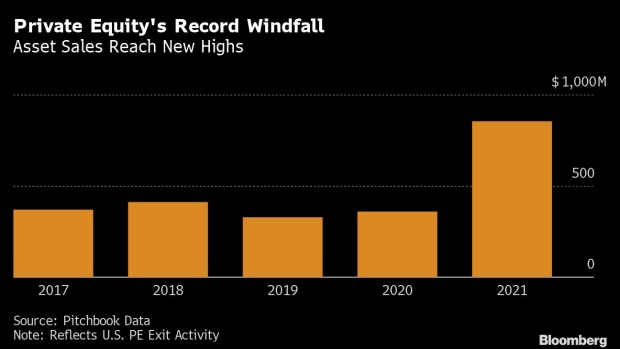(Bloomberg) -- The biggest private equity firms generated record profits from selling investments as markets charged ahead in 2021. It’s going to be a tough act to follow.
Blackstone Inc., Apollo Global Management Inc. and Carlyle Group Inc. collectively sold out of almost $150 billion in deals, double that of the prior year.
The influx of cash pushed earnings to new highs, minted new wealth for dealmakers and added to private equity’s allure during Wall Street’s war for talent. But the cash surge was a reminder of how the profits from exits are tied to the broader economy. Rising interest rates, inflation and the specter of Russia’s invasion of Ukraine now threaten to slow the torrid pace of realizations -- and the industry’s fortunes.
“Everything we’re watching in public markets could reduce the returns of private equity,” said Andrea Auerbach, global head of private investments at Cambridge Associates, an adviser for pensions and endowments. Returns across the industry, while good, “are largely built on unrealized value,” she said.
The pursuit of fast-growing companies by private equity firms could leave some vulnerable as rates increase and diminish the value of future cash flows and reduce valuations.
But 2021 was nothing short of an extraordinary year. Blackstone cashed out of a record $77 billion of investments as its corporate private equity and opportunistic real estate holdings rose more than 40%. KKR & Co. made a record $2.1 billion from successful exits in 2021, up 84% from the prior year.
Fast forward to 2022, and executives have signaled on earnings calls that this year will be different.
While Apollo Co-President Jim Zelter said the firm expects its “realization super-cycle to continue,” he also warned that exits could be delayed to later in the year if the current market persists. Apollo’s realizations nearly tripled in the year to $25.7 billion, with its private equity arm cashing out of a record $19.1 billion in deals.
Carlyle’s Chief Financial Officer Curtis Buser tempered market expectations.
“2021 was a special year” with the cash from exits, he said. But he also warned that such results “will be difficult to replicate.”
The company expects net realized performance revenues to average $1 billion over each of the next several years. Last year, Carlyle generated more than $1.5 billion.
Private equity’s ability to exit deals has been hampered by earlier turns in the market. During the previous buyout boom, the industry cashed out of $238.4 billion of deals in 2007, according to Pitchbook data. When the 2008 financial crisis rippled through markets, that figure plunged by more than 50%.
This year, the industry hasn’t been immune to the broader market selloff. Shares of the four largest U.S. alternative asset managers have declined along with S&P 500. KKR and Carlyle have slid 22% and 17%, respectively, this year through Thursday. The S&P is down 8.1% in that period.
Eyes on Fees
Facing the prospect of fewer exits, firms are focused on broadening their businesses to be less vulnerable to the feast-and-famine cycles of private equity.
Since going public, large firms have pushed into businesses that produce steady fees to counter any slowdown and satisfy shareholders, who place a higher premium on recurring cash streams than carried interest. This has transformed a freewheeling industry of leveraged buyout kingpins into a more buttoned-up business closer to asset management.
Carlyle executives said they’re looking for acquisitions to grow the firm’s credit business and the group that creates portfolios for investors. Even without such deals, it expects fee-related earnings to increase more than 20% this year. Officials also said the past year’s record $51 billion in fundraising would further bolster fee revenue in 2022.
Apollo has tried to position itself for the ups and downs of markets by building a stash of permanent capital -- money it locks up for the long haul and which accounts for 59% of assets. It predicted that so-called distributable earnings would rise 62% to $3.3 billion this year, mostly helped by recurring fees.
The firm will likely be helped by the steady fees from insurer Athene Holding, which it merged with in January. Apollo is also pushing to expand its retail business and loan origination, which offers higher-yielding debt to institutions than regular bonds.
Blackstone’s Shadow
The industry faces growing competition from Blackstone as the firm barrels toward $1 trillion in assets and expands its reach among individuals and insurers.
Blackstone took in $155 billion in new investor cash in the fourth quarter, more than the combined haul from Apollo, Carlyle and KKR. Half of that was insurance assets that Blackstone started managing after reaching deals with Allstate Corp. and American International Group Inc.
Individual investors also helped power Blackstone’s profits. The firm’s $54 billion non-traded real estate investment trust, BREIT, was the biggest contributor to earnings in the three-month period.
BREIT produces a stream of management and performance fees tied to appreciating assets, even if Blackstone doesn’t sell those underlying assets. Its main customers are retail clients.
©2022 Bloomberg L.P.






